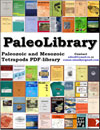
Complete Data Base of Paleozoic and Mesozoic Tetrapods.
Paleo-News and illustrations. Big electronic PDF-library.
| |
| PaleoNews |
| Classification |
| Books and Articles |
| Contact |
| Forum |
сайт о динозаврах
рейтинг сайтов
Free Counter
myspace hit counter
Discovering Texas Fossils - “These fossils don’t just tell the story of paleontology. They tell the story of Texas,” says Matthew Brown, the director of the Vertebrate Paleontology Collections at the Jackson School Museum of Earth History. |
|
by Sara R. Lentz Steven May, a paleontology research associate at The University of Texas at Austin, didn’t know what to expect when he cold-called D.W. Grant Jr., a rancher in South Texas, requesting to look for fossils on his land. “You know, here I was, this person he has never met before,” says May, “but I’m interested in the ranch, interested in its history, and he just welcomes me in.” The two drove around in Grant’s pickup looking at the geology and exchanging fossil stories. This was not Grant’s first time hosting a paleontologist on his family’s ranch. During the Great Depression, Texas fossils fueled jobs. The Works Progress Administration – a program created by President Franklin D. Roosevelt’s New Deal – employed millions of workers nationwide, including thousands of Texans. Part of the program was led by the celebrated Texas geologist Elias Howard Sellards, director of UT Austin’s Bureau of Economic Geology. Between 1939-1941 he was tasked with leading workers across the state to collect vertebrate fossils. Grant was a young boy in 1940 when his father, D.W. Grant Sr., welcomed Sellards and the WPA to the Broken Arrow Ranch in Bee County. Even though 76 years have passed, the memory is still clear. “DW had some of his own ideas about where I might go to look for fossils,” says May, “but he knew exactly where the WPA dig had been and drove me right there.” Just a dimple on a grassy hill, it is hard to tell that it was once a massive excavation site. The jackets ranged in size from dinner plates to refrigerators, some weighing more than 1,000 pounds. Approximately 11,000 specimens make up the university’s Works Progress Administration Collection.
The WPA fossils are stored at the Jackson School Museum of Earth History – one of the largest archives of fossils in North America. There are rows of shelves and drawers filled with these natural history artifacts – evidence of a deep connection throughout time between life in Texas and the landscape. Photo courtesy of the Jackson School of Geosciences. “There's a waning kind of collective memory of the WPA by the ranchers down there today,” says May. “And what I've found is that although they remember the dig, most of them don’t really know what was found and what it meant to the people.” Much of this material has been prepared and published, and some of the finer specimens have been placed on display in museums across the country, including the Texas Memorial Museum, the National Museum of Natural History (Smithsonian Institution) and the American Museum of Natural History. “Most people in Bee County aren’t aware that 10-12 million years ago right in their backyard were rhinos, camels, tiny horses and big elephant-like creatures,” says May. “It’s fun to share that aspect of it with them and see how interested they are.” A mural at the Smithsonian Institution shows mammals that ruled the Earth during the Miocene Epoch. Image courtesy of public domain. He takes the time to share pictures of fossils, talk about old discoveries and explain the need for more work. Researchers such as May are hoping to fill in the picture the WPA started. During the 1940s, paleontologists were out collecting fossils of mostly big animals known as megafauna, but he is searching for evidence of the smaller creatures. “We’re trying to reconstruct what South Texas looked like 12 million years ago based on the kinds of animals that lived there,” he said. “The whole notion of trying to understand the evolution of the Earth and reconstruct that history through time.” Field work isn’t the only way scientists are tackling this 12-million-year-old puzzle. At the university, more than 40 WPA jackets remain unopened. Notes and photographs give scientists clues about what are inside, but this part of the collection is a time capsule of potential research. Researchers are working on unpacking and studying the contents. The project is massive and meticulous, but the work is paying off. Just recently a new species of reptile was discovered from the collection, hidden in plain sight. Currently a lot of the unpacking is being done by a team of undergraduates from the Jackson School of Geosciences who were trained specifically for this project. Supported by donors from the HornRaiser, UT’s crowd funding project, the team raised over $17,000 to continue their work. Photo courtesy of The Jackson School of Geosciences. Matthew Brown, the director of the museum's Vertebrate Paleontology collection, says Texas is very valuable to paleontology because of the variety and depth of fossils found here. Finding new species is exciting, he says, but preserving the larger picture is more significant. “These fossils don’t just tell the story of paleontology. They tell the story of Texas,” says Brown. “These collections are the foundation of natural history research, and exciting discoveries are continually made thanks to the forethought and investment of past generations. It will be fascinating to see what the students of tomorrow find next.” After talking to the ranchers, May says he wonders what the workers from the WPA would think about their contribution to these discoveries. “I just imagine them talking about digging holes and looking for these old bones of old horses,” he says. “What must those guys have thought? What are these crazy scientists doing?” http://news.utexas.edu/2016/11/01/discovering-texas-fossils
|
